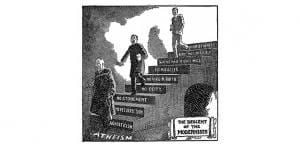 University education, financed by debt, without a coherent center, has lost the unified vision that kept it from being a multiversity. The trouble with a multiversity is that it presents the world as if there are “truths” over in the literature department at odds with the “truths” found in the engineering department. There is no center, no commonality, no shared values between the two.
University education, financed by debt, without a coherent center, has lost the unified vision that kept it from being a multiversity. The trouble with a multiversity is that it presents the world as if there are “truths” over in the literature department at odds with the “truths” found in the engineering department. There is no center, no commonality, no shared values between the two.
We could do job or skills training cheaply through apprenticeships. The university was to give us a unified vision of life, even if that vision merely resulted in a commitment to wonder!
A truly Christian education cannot be this way. A Biblical truth cannot be taught in Bible class, but optional in philosophy class. A scientific truth cannot be taught in Biology and then be optional to the Bible professor. This is incoherent, incompetent, and Ichabod.
A brief look at “truth” and “essential truth” will help.
On Essential Truth: Morals in a Community
Imagine that a proposition is so true, or thought to be so true that one must believe it to remain a member of the community. This is easiest to see with moral truths. In my neighborhood, you better not just assert the following is true, but live the truth:
It is morally wrong to burn down your neighbor’s house.
The property owner’s association has many beliefs about what we should do, but we would not have to call for their intervention if a neighbor became a pyromaniac. In fact, we are a community united around an even more philosophically controversial position:
You have a moral right to private property.
This might be discussed at the University of Houston, but we are not discussing it in our neighborhood. We would (of course) let a Marxist live in the neighborhood, but they probably would not become a fully integrated member of our community if they began to bag on Plekenov at the pool party. If they began to appropriate our stuff for the workers, they would not be long for the neighborhood.
These views are essential to being a full member of our community, even though our neighborhood is staggeringly diverse in other ways. An essential truth in a community is one that unites the community that is either so “true” that the community never reflects on it or is so true the community exists to defend that truth.
Another Kind of Essential Truth: the Defining Truth for a Community
Imagine a political party or group formed so that a tiny minority can find a place to discuss or advance otherwise unpopular views. That party might gather just so they can read, discuss, and work to implement in society the ideas of Plekenov. If you do not like or agree with Plekenov, the party seems within its rights to ask you to find another social or political gathering. It is hard enough to understand your own ideas without constantly having to defend them to others.
Let’s call this type of “essential truth” the assumed truth of the group. The Plekenov Party is a party just because it thinks Plekenov correct. It does not mean the Pleknovista are close minded. They might dialog and learn (at times) from many other parties and people. The defining truth may not (in fact) be true, but the Pleknovista often cannot know this if not allowed to work out the implications of their ideas in community.
On Truth (Briefly)
An essential truth is a “who we are” kind of truth. I should pause and note that a group might be mistaken about a “truth” they hold precious. A “truth” that is false is not a truth. A proposition, true or false, that is optional is not an essential truth. Internally to a group, a church, a college, or any organization is the idea that truth is non-negotiable. My great-grandfather was once asked if he thought he was wrong about anything.
”If I thought so, I would change my mind.”
Just so Great-Papaw.
There are then “truths” that we think to be true (there is only one truth!) that are essential to us. Even if wrong, these “truths” often must be explored in a likeminded community to discover if they are true. They can never be insulated from examination. If they are “optional,” then they are no longer essential and no longer defining to the community.
Application to Education
The university needs essential truths to unite disparate fields. What do we have in common? What are our core commitments? Most schools will tell you their supposed vision and purpose on the website. Do they mean what they say or is this boiler plate of a big business selling you a product?
Some schools do mean it. They have a mission and whether secular, religious, ecumenical, Protestant, Catholic, or Orthodox, they describe the essential truths. Nobody is left out or excluded from needing to be part of the community. Of course, that means if you do not share the mission, you should not try for a job there. After all, if you hate Plekenov, you should not try to get paid by the Plekonovistas!
A liberal arts college will express her vision and purpose, her essential truths, in general education. These are the courses all students must take, a core competency in a broad range of disciplines. As a result, the content must be basic: what every graduate can and should know.
The good news is that this essential truth is so basic that any professor in any discipline can master it over a few years of employment. We ask freshmen, sophomores, and seniors to grasp some basic math (for good reasons), science, philosophy, literature, psychology and other areas full of essential truths we deem a citizen should know. In a Christian college, we integrate our theology, the essential truths of our community, with every discipline. Shouldn’t a professor who teaches core, general education, have a working knowledge of the essential truths?
If not, the so called essential truths are a farce.
Education does not just take place in the classroom, the marketing people are sure to claim this is true, and it is. Conversations are never limited by the syllabus. For this reason every professor in a general education program should know the essential truths of the community. No general education program could coherently say: “We think numeracy, scientific, philosophic, theologic, cultural competence are all important, but your professors in any particular subject need not know about them or agree with our essential beliefs.”
Imagine a school where diversity was a key value, and ideas related to it taught. Would a department be able to opt out? If so, this is not really a community value or an essential truth. There might be political reasons to trumpet it, but that thing is no longer part of the core.
A Christian general education will integrate all the truths deemed essential in that community to every discipline or there is no Christian general education community or program.













